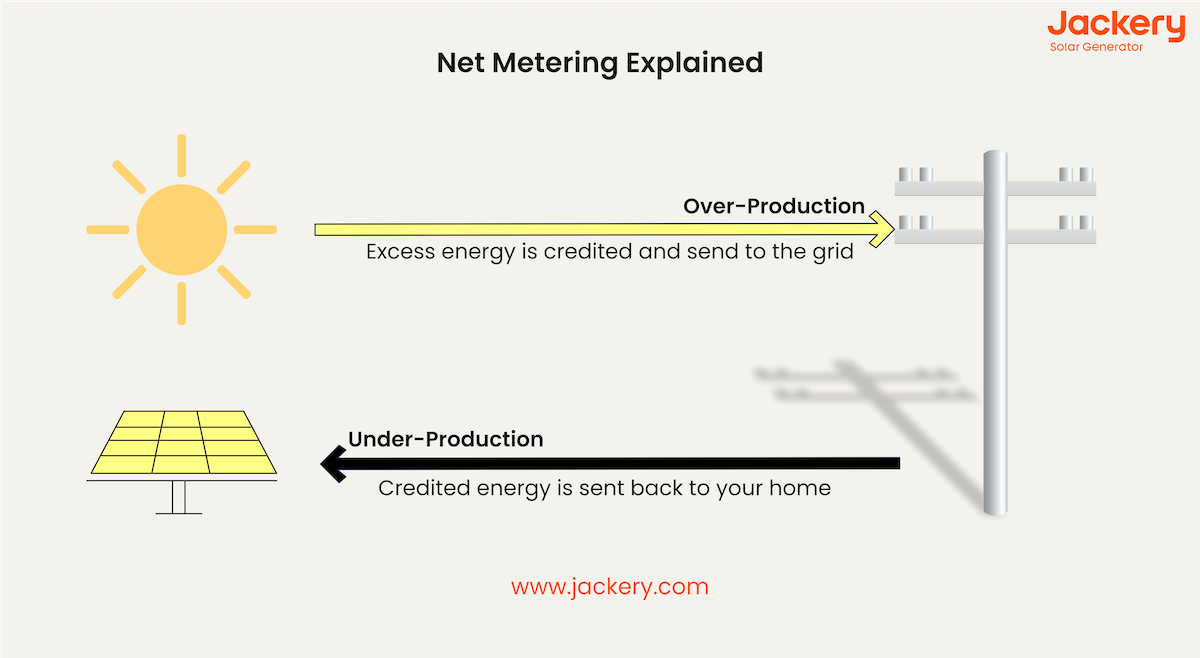Oregon is known for abundant sunshine and its cloudy and rainy weather, making it ideal for solar power. However, the initial expense of switching to solar energy is high. For this reason, the federal government and many utility companies offer financial incentives and rebate programs to reduce the cost of solar panel system installation. Some popular Oregon solar incentives include Oregon Solar + Storage Rebate, Solar Within Reach, and many local incentives in cities like Eugene.
Jackery Solar Generators are ideal solutions for experiencing solar energy with a limited budget. These portable and powerful battery-powered generators can supply electricity to household appliances for long hours, helping you reduce your monthly electricity bills. In addition, eligible homeowners can claim up to 30% of the total cost under the Residential Clean Energy Credit. For example, investing in the Jackery Solar Generator 2000 Plus Kit (4 kWh) will help you earn up to $1139.7 in tax rebates.
Oregon Solar Incentives in 2024
While Oregon has cloudy and rainy weather, the US state has experienced growth in solar installations over the past few years. The Solar Energy Industries Association (SEIA) revealed that Oregon's eco-conscious culture has led to an investment of $2.4 billion in renewable energy. The state provides many solar incentives, such as rebates, tax credits, and property tax exemptions, to encourage homeowners to transition to solar power. Here's a table that compares various solar rebates and incentives in Oregon.
|
Oregon Solar Incentives |
What Is It? |
Who Can Claim? |
When Can I Get It? |
How Much Can It Save? |
|
Federal Solar Tax Credit (ITC) |
Oregon homeowners receive up to 30% of the total cost of the solar panel system. |
Residential and commercial customers in Oregon. |
It is credited toward the annual federal tax return. |
You can earn up to 30% of the cost of a solar panel system. |
|
Solar + Storage Rebate Program |
It provides a rebate for solar panel installation and battery storage. |
Residents who install solar panels with battery storage. |
The rebate is paid to the solar contractor and automatically applied to the total cost of the solar project. |
You receive up to $5000 for solar electric systems and up to $2500 for energy storage systems. |
|
Solar Within Reach |
The program makes clean energy equipment accessible to low-income Oregon residents. |
Low-income Oregon residents. |
The amount is received to reduce the cost of the solar system. |
You will receive up to $0.90 per watt (up to $5400) or $1 per watt (up to $6000). |
|
Solar Electric Incentive Program |
Customers will receive an upfront rebate to reduce the cost of solar panel installation. |
Customers of PGE and Pacific Power. |
You will get an upfront payment. |
You might receive an upfront rebate of up to $900 - $1200. |
|
Portable Clean Energy Fund (PCEF) |
Nonprofits will receive grants for installing solar energy systems. |
Nonprofits in Oregon. |
The rebate is offered after the installation. |
Varies depending on the size of the solar panel system. |
|
Renewable Energy Systems Exemption |
The State of Oregon offers property tax exemption to exempt you from the taxes. |
Qualified purchases. |
You will receive the rebate amount after installation. |
Over the lifespan of the solar panel system, you will save thousands of dollars. |
|
Local Incentives |
It is available from the utility company, city, or county. |
Customers of investor-owned utilities in Oregon. |
Varies depending on the local utility. |
Varies depending on the local utility. |
|
Net Metering |
It helps customers offset or eliminate their utility bills with excess power their solar panels overproduce. |
All residents of Oregon. |
Once your system is running, you will receive credits toward the energy bills. |
Varies depending on how much extra energy is sent back to the grid. |
Federal Solar Tax Credit (ITC)
The Federal Solar Tax Credit also known as Investment Tax Credit depends on the investment in the solar panel system. It is available to both residential and commercial customers in Oregon. Presently, the ITC allows a deduction of 30% of the total installation cost of the solar energy system between 2022 and 2032.
If you install a $10,000 solar panel system, you are entitled to claim $3000 in federal tax return. Remember, the ITC is applied to the total cost of the system, including labor and equipment. It is only available to customers who own their solar system rather than lease it. The ITC will reduce to 26% in 2023 and 22% in 2034. You can claim the tax credit by downloading and filling out IRS Form 5695.
Solar + Storage Rebate Program
The Oregon Solar + Storage Rebate Program benefits residential and low-income customers in Oregon. Eligible customers and approved contractors can receive up to $5,000 for solar panels and $2,500 for battery storage. The rebate amount will depend on the solar panel system size, income status, and whether you are entitled to other incentives from utility companies.
In order to receive the rebate amount, you will need to install solar power panels and a battery storage system simultaneously—and that too from an approved contractor. The battery you install should have islanding capability, which should serve as a backup power source to the home when the grid is down. Let's compare solar and storage rebate amounts for different customer types.
|
Customer type |
Solar rebate amount |
Storage rebate amount |
|
Low-or-moderate-income homeowners |
$1,800/kW, up to 60% of the total cost |
$300/kWh, up to 60% of the total cost |
|
Standard homeowners who are eligible for other utility incentives |
$200/kW, up to 40% of the total cost |
$300/kWh, up to 40% of the total cost |
|
Standard homeowners who are not eligible for other utility incentives |
$500/kW, up to 40% of the total cost |
$300/kWh, up to 40% of the total cost |
Source: State of Oregon: INCENTIVES - Oregon Solar + Storage Rebate Program: Homeowners
Note: The net cost is calculated when we subtract the financial incentives offered by the utility companies or the Energy Trust of Oregon from the total project cost. However, the rebate amount cannot exceed $5000.
Solar Within Reach
Unlike other Oregon solar incentives that are available to most residents, Solar Within Reach is an income-qualified rebate program. It provides cash incentives to qualified homeowners, though the exact amount will depend on the number of residents living in the house and the gross annual household income.
You must own a residence from the following categories: single-family home, multi-family home, floating home, condo, and manufactured home. Additionally, you must work with an Energy Trust-approved solar trade contractor. Depending on the number of residents in the house, the gross annual income should not exceed the program limits.
|
Household Size |
Gross annual income maximum |
|
1 person |
$62,530 |
|
2 people |
$81,770 |
|
3 people |
$101,010 |
|
4 people |
$120,252 |
|
5 people |
$139,492 |
|
6 people |
$158,732 |
|
7 people |
$162,341 |
|
8 people |
$165,948 |
Source: Solar Within Reach - Energy Trust of Oregon
Note: The amount of incentive you receive will directly depend on the electric utility company and the solar system size. For example, if you are a Portland General Electric customer, you can earn up to $5400 ($900 per kW for solar) and up to $10,000 ($750 per kW for storage). On the other hand, if you are a Pacific Power customer, you can earn up to $6000 ($1000 per kW for solar) and $10,000 ($750 per kW for storage).
Solar Electric Incentive Program
Oregon's top utility companies—Portland General Electric (PGE) and Pacific Power—offer financial incentives to their customers. The program pays an upfront rebate of up to $1200 to PGE customers and $900 to Pacific Power customers. To qualify, you must work with an approved Energy Trust solar trade ally contractor and purchase the solar energy system.
Portland Clean Energy Fund (PCEF)
The Portland Clean Energy Fund (PCEF) is an environmental initiative in Oregon created and led by communities of color. It provides grants to nonprofits to assist with installing solar energy systems. To submit an application and receive grants, you must visit the official PCEF website.
Renewable Energy Systems Exemption
Many US states offer solar equipment installation sales and property tax exemptions, making renewable energy available to Oregon residents. You won't pay any additional sales tax on solar energy installation, helping you save thousands of dollars over the equipment's lifespan.
Even though the solar panels will increase the home's value, they won't lead to additional property taxes. The average property tax rate in Oregon is 0.82%, and the average system costs $31,160. This increases the annual savings to $255 without batteries and $378 with batteries. In order to be eligible for the solar property tax exemption, you need to install a solar system and confirm that it can offset your onsite electricity consumption.
Oregon Local Incentives
In addition to offering statewide incentives, many cities in Oregon offer local incentives to encourage solar panel systems.
Eugene Water & Electric Board: The EWEB provides a rebate amount of $0.40 per watt installed or up to $2000 (whichever is less) to qualified customers. These solar incentives in Oregon are offered on a first-come, first-served basis.
Salem Electric: The qualified customers will earn a rebate of $300 per kW installed rebate up to $1500 or 50% of the project costs. The solar systems that are net metered, comply with Salem Electric Net Metering Policy, and have a capacity of nearly 25 kW or less are qualified.
Ashland Electric Utility PV Rebate Program: In Ashland, residents can receive a rebate or grant of up to $600 for installing a solar panel system.
Central Lincoln PUD Renewable Energy Incentive Program: The utility customers are entitled to receive up to $2000 or $500 per kW. You need to submit the project for review and seek approval before installation.
Oregon Net Metering
Net metering in Oregon is a helpful program that can save money and reduce the payback period on a solar energy installation. It allows you to sell excess energy generated by the solar panels to the grid in exchange for credits on the utility account.
When you install grid-tied solar systems, the utility provider will also install a two-way electricity meter. It will measure the electricity flow into the home and energy flow from solar panels into the grid. You'll have to pay for that difference if you have used more energy than supplied back to the grid. On the other hand, if you put more energy into the utility grid than used, you'll receive credits on the account.

There are two requirements to enroll in net metering, including:
- You must install a solar inverter that meets IEEE 1547 and UL 1741 standards.
- You must have home solar systems installed professionally.
Pacific Power and PGE are the two largest utility companies offering net metering programs in Oregon.
Are There Any Energy Storage Incentives in Oregon?
In addition to Oregon solar incentives, the US state also offers some battery or energy storage incentives to reduce the total price of energy storage. One of the energy storage incentives is the Oregon Solar + Storage Rebate Program, which allows you to earn up to $2500 in rebates for the battery. Another is the Solar Within Reach program, which lets you earn $10,000 as a financial incentive. If you are installing batteries above 3 kWh, you might also qualify for a 30% Federal Tax Credit.
Is Solar Worth It In Oregon?
While Oregon is known for rainy weather, the state receives abundant sunlight on an average of 142 days. The state also offers many solar incentives, such as the Solar Within Reach Program, Oregon Solar + Storage Rebate Program, and local incentives. This reduces the upfront cost of installing solar energy systems. Solar panel systems are worth it in Oregon as they allow you to save money on high electricity bills and help you switch to clean energy. Reducing your dependence on fossil fuels lowers your carbon footprint and preserves the environment.
Jackery Solar Generators in Tax Rebates
Jackery is a leading manufacturer and seller of solar panels, solar generators, and portable power stations. The Jackery Solar Generators combine efficient Jackery Explorer Portable Power Stations and foldable Jackery SolarSaga Solar Panels that collect, convert, and supply electricity to household appliances. Thus, it helps you offset the cost of monthly electricity bills and invest in solar energy.
Investing in the Jackery Solar Generators allows you to earn a tax rebate of up to $839.7 to $1139.7, depending on the size of the solar system. In order to claim the Federal Solar Tax Credit (ITC) or Residential Clean Energy Credit, all you need to do is fill out Form 5695. Here are the popular Jackery Solar Generators ideal for indoor and outdoor activities:
Jackery Solar Generator 3000 Pro
The Jackery Solar Generator 3000 Pro has a large-capacity battery-powered generator that can supply steady power to 99% of household appliances, including air conditioners, space heaters, LED lights, TVs, mobile phones, etc. The powerful solar generator can help reduce the monthly electricity bills and save money up to $839.7 in tax rebates. In addition, if you want to practice off-grid living and switch to clean energy, this Jackery Solar Generator 3000 Pro might be the right pick. Its safe and stable NMC battery and fully upgraded BMS allow you to safely charge appliances.

Customer Review
"Works great so far with home charge and solar charge. Will be hooking it up to my pop-up camper next week. Great size, quiet and good app so far." — James Matthews.
Jackery Solar Generator 2000 Plus Kit (4 kWh)
The Jackery Solar Generator 2000 Plus Kit (4 kWh) can efficiently power heavy-duty devices up to 6000 W. It is an expandable solar generator that can supply power for a relatively long time during extended blackouts and power outages. With the additional Jackery Battery Pack 2000 Plus, you can expand the battery capacity from 2 kWh to 24 kWh — elevating off-grid living to the next level. It is an ideal emergency battery backup power to charge most essential equipment for long power — all thanks to its high power output. You'll be entitled to receive up to $1139.7 in tax rebates if you qualify for the refund.

Customer Review
"The 2000 Plus battery pack is an excellent way to expand your storage if you already have one of the Jackery Solar Generators in the 'Plus' line. No frills, easy-to-use connections, and charging times were as reported. Built-in handles make carrying simple." — Patrick Walz.
|
|
Solar Generator 3000 Pro |
Solar Generator 2000 Plus Kit (4kWh) |
|
Capacity |
3024 Wh |
2-24 kWh |
|
Battery Cell |
NMC |
LiFePO4 |
|
Cycle Life |
2000 cycles to 70%+ capacity |
4000 cycles to 70%+ capacity |
|
Output Ports |
AC Output (x1): 120 V~ 60 Hz 25 A Max AC Output (x3): 120 V~ 60 Hz 20 A Maximum USB-C Output (x2): 100 W Maximum, 5 V⎓3 A, 9 V⎓3 A, 12 V⎓3 A, 15 V⎓3 A, 20 V⎓5 A |
AC Output (×4): 120 V~ 60 Hz, 20 A Maximum AC Output (×1): 120 V~ 60 Hz, 25 A Maximum USB-A Output (x2): Quick Charge 3.0, 18 W Maximum USB-C Output (x2): 100 W Maximum, (5 V, 9 V, 12 V, 15 V, 20 V up to 5 A) |
|
Working Hours |
Refrigerator (300 W): 8.5 H Water Pump (800 W): 3.2 H Water Heater (1000 W): 2.5 H Stove (800 W): 3.2 H Air Conditioner (1000 W): 2.5 H |
Refrigerator (300 W): 11.5 H Water Pump (800 W): 4.3 H Water Heater (1000 W): 3.4 H Stove (800 W): 4.3 H Air Conditioner (1000 W): 3.4 H |
|
How Much It Can Save with Tax Rebates |
$839.7 (Though this is an estimated value) |
$1139.7 (Though this is an estimated value) |
Oregon Solar Incentives FAQs
Does Oregon offer incentives for solar panels?
Oregon provides rebates and financial incentives to homeowners installing solar electric or paired solar + storage systems. Residential customers with low or moderate incomes might also qualify for higher rebates.
What is the Oregon solar rebate for 2024?
Qualified low—and moderate-income households qualify for a solar rebate of up to $1.80 per watt. The maximum incentive is up to $5000 or 60% of the solar system cost. If you are not qualified as a low—or moderate-income household, you can earn up to $0.20 — $0.50 per watt of installed capacity.
Does it make sense to get solar panels in Oregon?
Investing in solar panels is worth the price if homeowners want to offset electricity costs or combat power outages.
How much does it cost to get solar panels in Oregon?
The average solar panel system in Oregon costs around $3.28 per watt. With a 9.5 kW system, you can offset the monthly electricity consumption of around 916 kWh. That means the average system cost is $31,160 or $21,812 after the 30% federal tax credit.
Does Oregon have a free solar program?
If you live in Oregon, you are eligible for free solar panel installation at your house. Various programs offer free panel installation to reduce upfront costs. For example, solar leases and loans enable homeowners and business owners to own solar panel systems without paying a high upfront cost.
Final Thoughts
Solar power in Oregon is one of the eco-friendly and sustainable choices for homeowners. The various Oregon solar incentives can significantly reduce upfront solar installation costs. Furthermore, the net metering system helps the residents to reduce their electricity bills and offset utility power usage. Jackery Solar Generators are much more affordable than rooftop solar panel installation as they do not require any installation. For example, the Jackery Solar Generator 3000 Pro has a powerful charging solution that can charge 99% of household appliances. If you qualify for the Residential Clean Energy Credit tax rebate, you are entitled to receive up to $839.7.
References
Homeowner’s Guide to the Federal Tax Credit for Solar Photovoltaics | Department of Energy
State of Oregon: INCENTIVES - Oregon Solar + Storage Rebate Program: Homeowners
Solar for Your Home - Energy Trust of Oregon
Solar - Energy Trust of Oregon
Oregon Solar Panel Costs, Incentives, Benefits
Apply for a PCEF grant | Portland.gov
Residential Solar PV Program | EWEB
Energy Efficiency Programs & Incentives
Conservation In Ashland - Conservation Division - Administration - City of Ashland, Oregon












































































































![Guide to Oregon Solar Incentives, Rebates, & Tax Credits [2024]](http://www.jackery.com/cdn/shop/articles/oregon_solar_incentives_by_jackery.jpg?v=1713954359)






Leave a comment